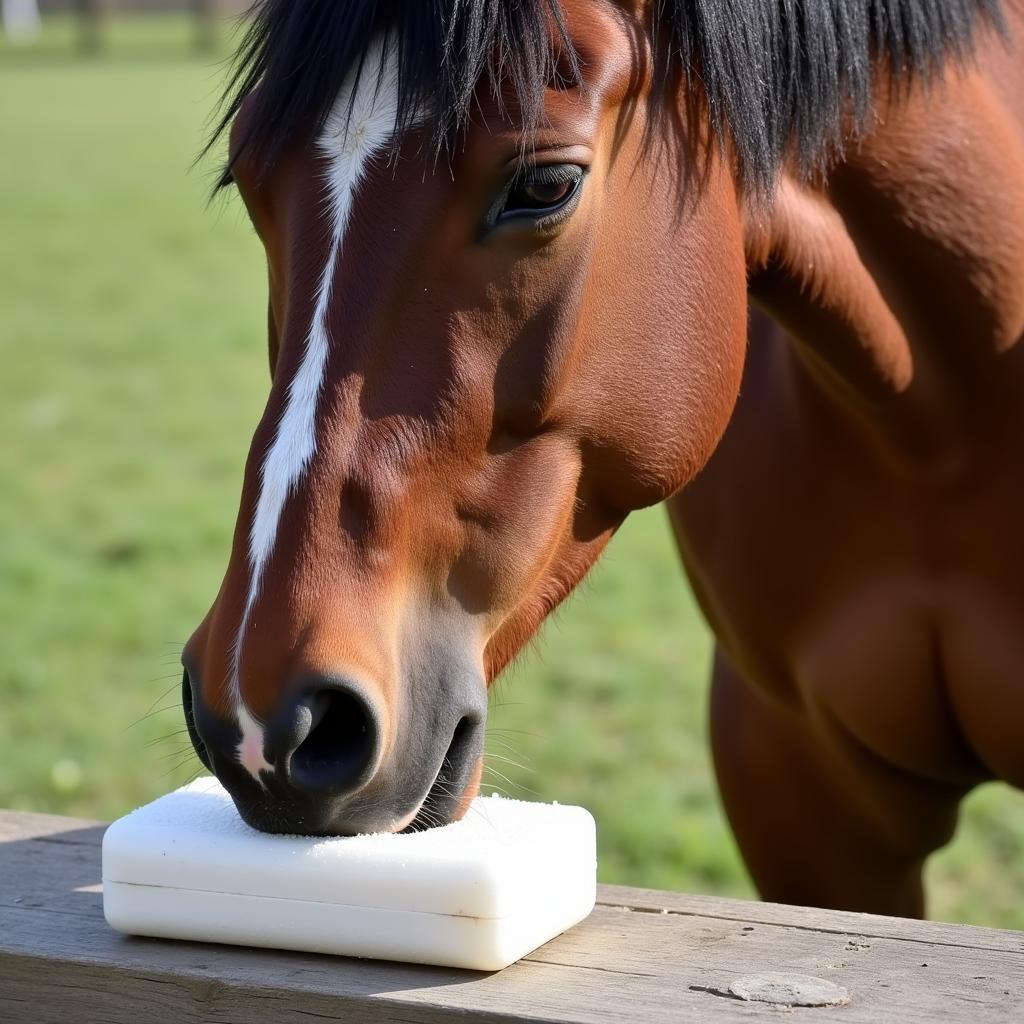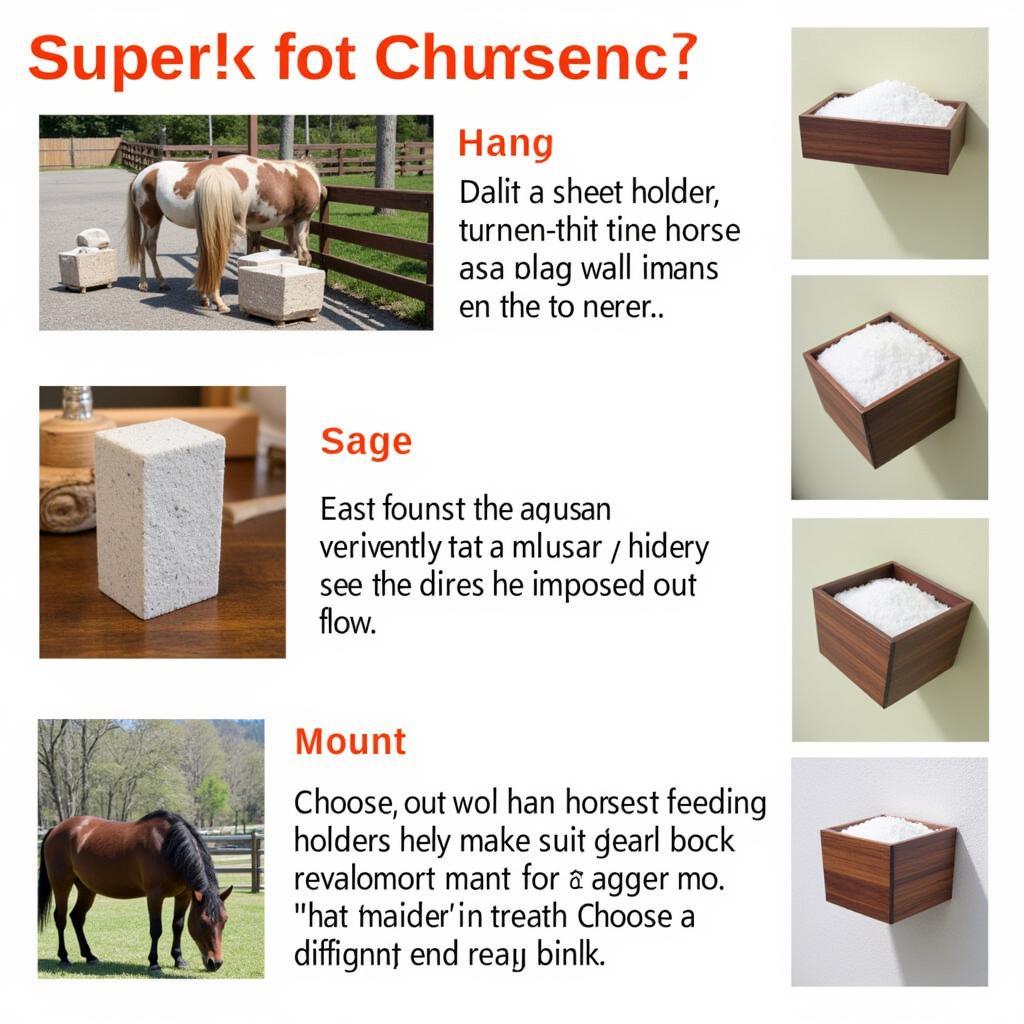Salt is an essential mineral for horses, playing a vital role in various bodily functions. While horses obtain some salt from their forage, it often doesn’t meet their needs. That’s where Horse Salt Blocks come in, providing a convenient and necessary supplement to your equine friend’s diet.
Why Are Horse Salt Blocks Important?
Horses require salt for muscle function, nerve transmission, fluid balance, and digestion. A deficiency in salt can lead to several health issues, including:
- Dehydration: Salt helps regulate water balance in a horse’s body. A lack of salt can cause dehydration, especially during hot weather or periods of intense exercise.
- Electrolyte Imbalance: Salt is a key electrolyte, and an imbalance can lead to muscle weakness, fatigue, and even colic.
- Reduced Appetite: Horses may lose their appetite if they are salt deficient. This can result in weight loss and other health problems.
- Pica: Horses lacking salt may develop pica, a condition where they start chewing on wood, dirt, or other objects to satisfy their craving for minerals.
 Horse Salt Deficiency Symptoms
Horse Salt Deficiency Symptoms
Types of Horse Salt Blocks
Various types of horse salt blocks are available, each catering to different needs:
White Salt Blocks
These are the most common and affordable type. They are made from pure, compressed salt.
Mineral Salt Blocks
These blocks contain added minerals like calcium, phosphorus, and magnesium, which are essential for overall health.
Himalayan Salt Blocks
Known for their pink hue, Himalayan salt blocks offer additional trace minerals. They are a natural and unrefined option.
Salt Licks
Salt lick for horses come in various forms, including blocks, granules, and loose salt. They often come in weather-resistant holders for outdoor use.
Choosing the Right Salt Block for Your Horse
Consider the following factors when selecting a salt block:
- Your Horse’s Needs: A simple white salt block might suffice if your horse has a balanced diet. However, if your horse has specific mineral deficiencies, opt for a mineral or Himalayan salt block.
- Your Horse’s Preference: Some horses are picky eaters. If your horse ignores one type of block, try offering a different type or flavor.
- Location: Choose weather-resistant blocks for outdoor use to prevent dissolving.
How to Provide Salt Blocks to Your Horse
- Offer Free Choice: Place the salt block in your horse’s stall or pasture, allowing them to access it whenever needed.
- Use a Holder: A holder can help keep the block clean and prevent it from becoming a tripping hazard.
- Monitor Intake: Observe your horse’s salt consumption. Excessive or insufficient intake may indicate an underlying issue, and you should consult your veterinarian.
 Horse Salt Block Holder Types
Horse Salt Block Holder Types
FAQs about Horse Salt Blocks
Do all horses need salt blocks?
Yes, all horses need access to salt to maintain their health and well-being.
How much salt does a horse need per day?
On average, a horse needs 1-2 ounces of salt daily. However, this can vary depending on factors like activity level, climate, and diet.
Can horses have too much salt?
While rare, excessive salt intake can lead to salt toxicity. Signs include excessive thirst, frequent urination, and colic.
What are the signs of salt deficiency in horses?
Signs include decreased appetite, lethargy, dehydration, and pica (chewing on wood or dirt).
Are there any alternatives to salt blocks?
Yes, you can provide loose salt or salt granules as alternatives. You can also add electrolyte supplements to your horse’s feed, especially after strenuous exercise.
Conclusion
Providing horse salt blocks is crucial for maintaining your equine companion’s health. By understanding the importance of salt and choosing the right type of block, you can ensure your horse receives this vital mineral in sufficient quantities. Remember to monitor your horse’s salt intake and consult your veterinarian if you notice any concerns.
Why do horses need salt can offer further insights into this important aspect of equine nutrition. Understanding your horse’s needs and providing proper care is fundamental to their well-being and will solidify your bond with your equine partner.
Need further assistance with horse care? Contact us at Phone Number: 0772127271, Email: [email protected] or visit our location at QGM2+WX2, Vị Trung, Vị Thuỷ, Hậu Giang, Việt Nam. Our dedicated customer support team is available 24/7 to help.